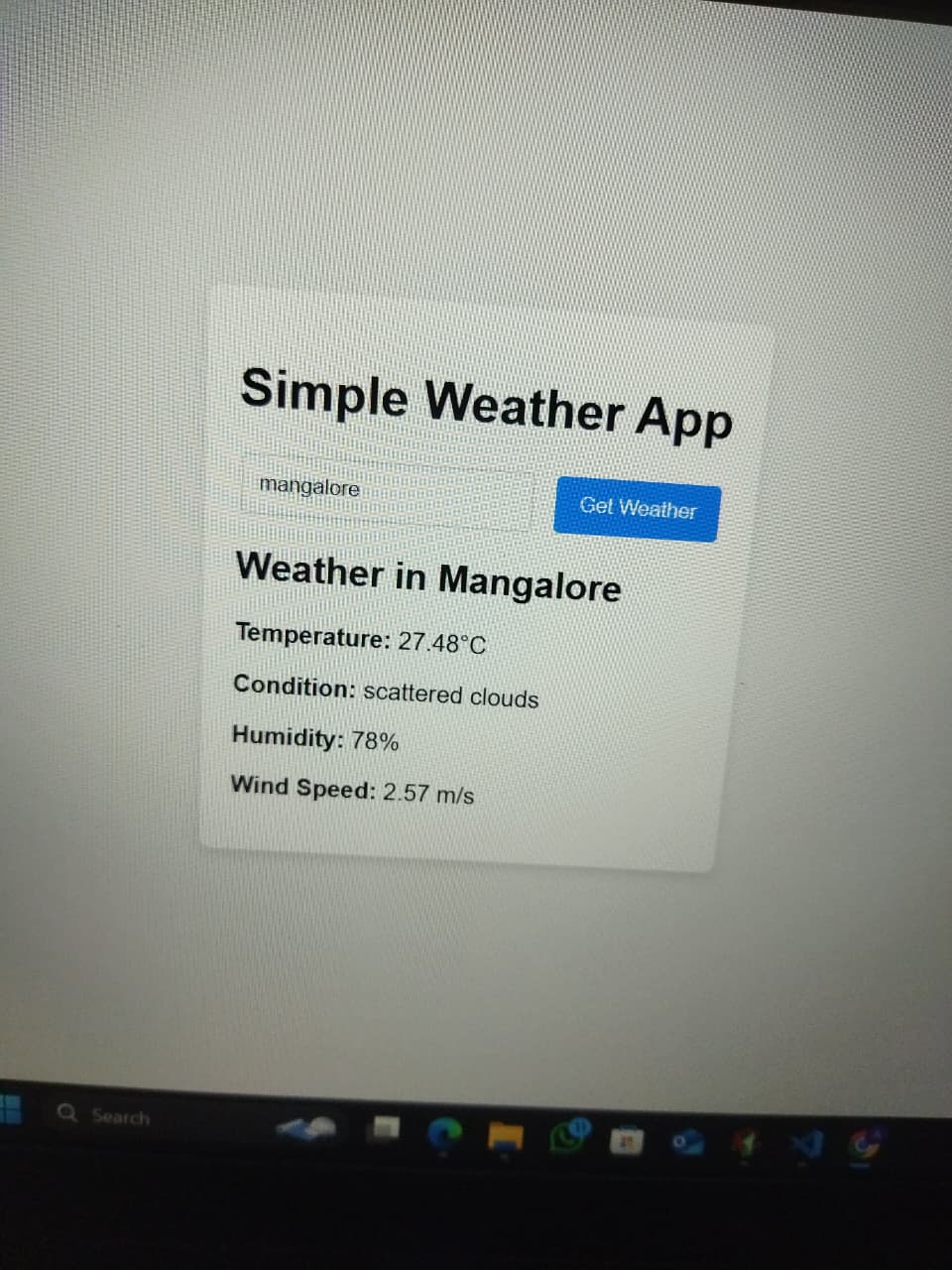
COURSEWORK
Vasanth's IOT-001 course work. Lv 1
| Vasanth Kumar | AUTHOR | ACTIVE |

26 / 10 / 2025
TASK1:Soldering Basics
Objectives
understand the basics of soldering in electronics.
Outcomes and Learnings
Practiced soldering components onto a PCB.
Learned the use of flux for clean and continuous joints.
🖼️ Soldering Practice:

TASK 2: Weather App Using API
Objectives
Learn how APIs work by creating a live weather web application.
Outcomes and Learnings
Explored real-life applications of APIs in:
Social Media Logins
Weather Services
Online Shopping
Travel & Navigation
Successfully created a weather app using OpenWeather API. code: https://github.com/vasanth18-shetty/open-weather-api-code
🖼️ Screenshot of the app:

TASK 3: 555 IC Astable Multivibrator (60% Duty Cycle)
Objectives
Design and simulate an astable multivibrator using a 555 timer.
Outcomes and Learnings
Built and tested the circuit to produce a square wave.
Measured waveform on an oscilloscope.
Achieved a duty cycle close to 60% (measured 56.93%).
🖼️ set up:

TASK 4: Working with GitHub
Objectives
Learn the basics of Git and GitHub.
Understand how to collaborate on projects using pull requests.
Outcomes and Learnings
Cloned repositories and created branches.
Identified and fixed errors in code.
Committed changes and pushed them to GitHub.
Opened pull requests and collaborated efficiently.
corrected code photo:

TASK 5: Portfolio Webpage
Objectives
Learn HTML, CSS and design a personal portfolio webpage.
Outcomes and Learnings
Built and deployed a personal portfolio site.
Improved web development and design skills.

click here for my portfolio: https://github.com/vasanth18-shetty/portfolio-of-vk/commits?author=vasanth18-shetty
TASK 7: Speed Control of DC Motor
Objectives
Control the speed of a DC motor using L298N motor driver with Arduino.
Outcomes and Learnings
Built a circuit with Arduino UNO, L298N driver and potentiometer.
Adjusted the motor speed by rotating the potentiometer.
Understood PWM (Pulse Width Modulation) concept.
🖼️ Setup Image:

TASK 8: LED Toggle Using ESP32
Objectives
Control an LED remotely using a web server hosted on ESP32.
Outcomes and Learnings
Learned how to use ESP32 GPIOs for digital output.
Created a web interface to toggle LEDs.
Strengthened embedded systems and IoT fundamentals.
🖼️ Setup Image:

#TASK 9: 3D Printing
Objectives
To understand the basics of 3D printing technology.
To learn about STL files and how slicing works.
Outcomes and Learnings
Designed simple 3D models using TinkerCAD.
Explored STL files and how they are sliced into G-code using Cura.
Understood how the 3D printer prints objects layer by layer.
Gained insights into post-processing after printing is completed.
TASK 11: K-Map & Burglar Alarm Circuit
Objectives
Derive logic expressions using Karnaugh Map.
Build a burglar alarm system based on digital logic.
Outcomes and Learnings
Designed the truth table and K-map for alarm logic.
Built a logic circuit that activates an alarm when:
Door is open (1)
Key is not pressed (0)
🖼️ K-Map & Logic Table:

TASK 12: Active Participation
Objectives
Actively engage in college-level hackathon and technical activities.
Outcomes and Learnings
Participated in codefurry 8.0 powered by ARTPARK, 1-HUB @IISC,the 8th Annual level Hackathon conducted by IEEE UVCE
Improved communication, problem-solving, and placement readiness.
🖼️ Certificate: 
TASK 13 : TINKERCAD
Objective:
To create an account on TinkerCad and get familiar with basic components of circuits. and make a simple circuit which measures distance of an object from the ultrasonic sensor.
Outcomes and Learnings:
TinkerCad is an online 3D modelling and circuit tool. I learnt about microcontrollers and ultrasonic sensors and I have successfully made a distance measureing circuit using Arduino UNO and Arduino IDE(how to upload the code)
Link to simulate my task.(https://www.tinkercad.com/things/4glqSoWZSg4-vasanths-tinkercad-task-level-0)
photo:

TASK 6: DATA SHEET REORT WRITING
OBJECTIVES
to learn how to write the report
MQ135 is a low-cost semiconductor gas sensor used to detect a wide range of harmful gases in the air such as ammonia (NH₃), nitrogen oxides (NOₓ), alcohol, benzene, smoke, and carbon dioxide (CO₂). Component Overview Sensor Type: Chemical / Semiconductor
Output: Analog voltage (can be converted to digital via ADC)
Features: High sensitivity to multiple gases Low cost Long life and stability
Working Principle
MQ135 uses SnO₂ (Tin Dioxide) which changes resistance when exposed to gases. In clean air, the sensor has high resistance. When polluted gases are present, the resistance drops, and this change is converted into a voltage signal. HERE IS THE PIC WHICH I REFERED TO KNOW ABOUT IT report:https://github.com/vasanth18-shetty/data-sheet-report-writing-vasanth-/commits?author=vasanth18-shetty